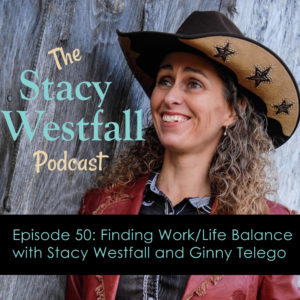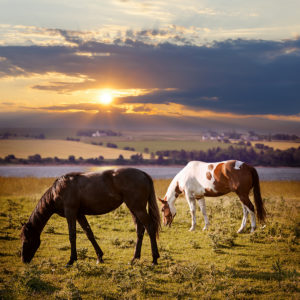Episode 50: Finding Work/Life Balance with Stacy Westfall and Ginny Telego

I am live today with Ginny Telego recording from the Loko Bean in Loudonville, Ohio. Today is a milestone, because this is episode 50, so I thought I’d do something different and share our special conversation with you. We are both very busy, so we kick off the show talking about something everyone struggles with. Work life balance. In fact, I don’t even see balance as something that’s possible. Life has seasons. We may have balance for a moment, but it’s more about adapting and moving from one season to the next.
We talk about what balance really is and if it’s even possible to find. We talk about how it applies to horse training, writing in nice journals, and if it’s possible to balance life, work, family, and business. We also talk about what you do when life throws you off balance like recently when Ginny’s house burnt down. We talk about adapting, grieving, and fear of failure. We really just take you on a conversation with two busy horse professionals who are trying to live their best lives.
“When people get in trouble with horses it’s when they want balance every day.” Stacy Westfall Click To TweetShow Notes:
[01:53] Stacy has moments of balance, but she doesn’t really view life as a balance. She looks at it more like seasons.
[03:22] Fall makes Stacy want to lay down in the grass and have a nap in the sun.
[05:35] Balance is more like a mindset. There is no one solution.
[06:01] Stacy talks about how daily balance shouldn’t be the goal when training horses.
[07:33] Sometimes when training horses everything has to be deconstructed and taken all apart. If you have balance, you wouldn’t want to take anything apart.

[08:48] Stacy has been buying Fringe journals. She writes more carefully in her nice journals, but her notepad is for messier thoughts.
[11:35] When you’re on a horse with no stirrups you have to be able to adjust yourself moment to moment. The stronger rider you are, the easier it is to rebalance.
[13:04] Balance is really more of a mental balance, even if physical balance is a great analogy.
[14:49] Ginny had to have the mental ability to adapt when her house burnt down. It’s not really balance, it’s adapting.
[17:39] Ginny lost her dogs in the fire, and she had to open herself up to getting new dogs.

[20:05] We really don’t have control over anything. Our brains seek certainty, uncertainty is certain. It’s healthier to learn to adapt than to try to control everything.
[25:36] Grieving can happen for the death of a dream.
[29:27] We talk about avoiding things when you don’t want to fail. Ginny took her own journey of self-awareness.
[31:34] After a loss, we are forced with decisions of whether to take a safe path or to put ourselves out there again.
[34:48] We have to take chances and allow vulnerability. Negative things can also happen after success.
[41:05] Why do we feel like we have to force ourselves to do things we don’t want to do? Why do we discount what we are really feeling?

[47:45] As human beings, we practice incongruence, because we don’t want other people to feel uncomfortable.
[53:49] We have organic conversations, because we are congruent with who we are.
[54:58] We are always trying to help our clients take information from horses and use it in a useful way.
[01:02:20] If we ask our horses to step into uncertainty, it’s only fair that we do the same thing.
[01:07:44] Ginny is doing her graduate program for her not other people. She is being congruent on why she is doing it.
“It's been more important for me to find the ability to regain my balance fairly quickly. So that even when something uncertain happens, it doesn't completely throw me off.” Ginny Telego Click To TweetLinks and Resources:
5 Comments
Leave a Comment
SUBSCRIBE TO THE PODCAST HERE:





YOURS FREE
WHY IS MY HORSE...?




Love, love LOVE this podcast. It has awakened so much within myself and my personal growth. The honest communication that you guys have is so refreshing and transcendent. Just to put myself out there, I have a question regarding congruency with our goals/dreams. What if our present self isn’t congruent with our dream or goal at that particular time/moment? Be that through fear or whatever is blocking our success. Should we push through at that moment? Would not pushing through mean that we are less of a human being? Perhaps if we were to never overcome that fear, then yes. However, if we seize the moments when our feelings are congruent, we can begin to accomplish our goals, regardless of how fast or slow that may be. I know for myself in the past, working with horses, a living, breathing, thinking, feeling being, working incongruently has created disharmony and miscommunication within the relationship. So, by being aware of my mental/emotional blocks and not pushing through and working with a horse does that slow my progress, or does it prevent miscommunication and misunderstanding, confusion with a horse and within the relationship and potential issues that may arise from that? Your thoughts ? Maybe an intro for a similar topic you could cover next time you’re catching up over a cuppa with Ginny ?
Cheers
P.S If that particular conversation is anything like the phone calls between myself and a good friend of mine, it went much longer than the podcast ? Room for part 2 maybe?
Love your work and thank you, again, for sharing your inspiration and knowledge. ?
Thanks for your feedback! When deciding to record this I was a bit apprehensive but I knew it was something I would like to hear!
Now to answer some questions.
One thought: Being congruent with yourself is different than being congruent with a goal.
Horses are amazing. They can accept me even when I’m trying something new. The one thing they don’t appreciate much is being around someone who is ‘beating themselves up’ when working toward a goal because it is so much negative energy.
For example, I can be struggling with a lead change (my timing, my feel, my whatever) and I can even be intense while I’m very focused. The horse will be fine. But if I start getting angry/judgmental, etc with myself…the horse has a harder time with that.
I can’t say I would never beat up my horse…but be with my horse and beat up myself. My horse will see the inconsistency there.
Not to be confused with the inconsistency of my cue system during the lead change disaster. My horse is fine with that!
Another thought: Anytime you set a goal (learn lead changes) you will encounter some form of “cognitive dissonance.”
To go from ‘I don’t know how to do lead changes’ to ‘I know how to do lead changes’ is a type of belief system change. I think in many goal setting situations this is more of what people experience.
But I’m going to get Ginny involved here too! I want to hear her answer. Or…I’ll invite her to coffee/tea!!!
That’s a great explanation Stacy. I completely agree that being congruent/incongruent is not the same as cognitive dissonance. In leadership, there’s a huge amount of research and evidence that leading collaboratively is way more effective than the traditional command and control style of leadership. If someone believes that command and control is the only way to be a leader, despite the evidence to the contrary, they are experiencing cognitive dissonance. On the other hand, if I am in a leadership position and walk into a meeting feeling nervous but outwardly try to project that I’m “fine,” that’s incongruence and people (like horses) will pick up on that energy. It’s uncomfortable. We have to be congruent with our horses all the time — we have to just say “I’m not sure I can do this lead change” and then be okay with understanding that we may just need additional practice to get there. But saying “I can’t learn to do lead changes” and then doing it when you are at a clinic with Stacy is dissonance — the evidence contradicts your belief! This whole mindset stuff is really challenging but if you can identify what your brain is telling you and are open to examining whether that belief, perception or assumption is actually true, you’ll find that you are able to overcome challenges much more quickly. Looking forward to diving into this topic at another coffee/tea conversation!
I see you guys have some deep conversations at the local coffee shop. I am glad that you always are yourself and I think that is why I relate to you and your training style. I know that when I come to your place I can be myself. I can tell you exactly how I feel, laugh, be silly, ask many questions, and know that you will not judge or make me feel incompetent. You are very good at seeing the strengths in people and helping them with their weaknesses. I know I have goals that I have still not achieved like loping the four leaf clover pattern or changing leads, however I have achieved so many little goals along the way that I am very happy at what I have done because I learned how to do it and communicate it with my horse. It is very satisfying / a feeling of accomplishment knowing that I had a huge part in training Hildy. So I have now shown in 4 local shows. You helped give me the confidence to get through that hurdle. I have learned that when I go out in the arena, it is just Hildy and I and at the end….I do not compare myself to others…I look back on my past rides and see how we improved from before. That is the most important to me. You are my Stacy Angel on my shoulder while I am riding…encouraging me along the way. 🙂 You guys are spot on about being uncomfortable. I like being in my safe zone. I need a little nudge sometimes to get me to do something uncomfortable. You have definitely helped with that. For me to attend 4 shows this year is really pushing me out of my comfort zone. GREAT PODCAST!!
I have been really impressed with your dedication to Hildy over the years in all ways. It has been a pleasure to help you.
I was REALLY impressed when you went out of your comfort zone and went to that first show. I’m not saying that every has to show…but I do know there are lots of lessons that can be learned there.
Your improvement was rapid as you could quickly see what things you were changing when you went to the show (your nerves, supporting/not supporting Hildy, doubts, etc). All the work that you did before
lead to you being able to identify and improve. On you own. From what you have learned.
Glad you enjoyed the podcast!